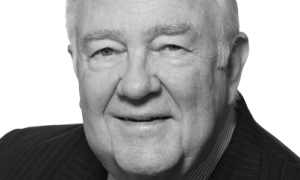Fifty-five years ago, freedom reigned for a brief moment in Communist Hungary. On October 23, 1956, student protesters marched through the streets of Budapest demanding an immediate end to their Soviet-dominated government.
Before long, the demonstrators had dissolved the Communist regime and set up an interim government based on democratic principles.
But the miracle was short-lived. Two weeks later, Soviet troops invaded Budapest to crush the revolt, which they did swiftly and ruthlessly. In total, more than 2,500 Hungarians were killed in the two-week revolution. The flicker of freedom behind the Iron Curtain had been extinguished.
Today, with a statue in the appropriately named Freedom Square in Budapest, Hungarians will honor the man who helped secure their freedom at last from Communist rule. It is just one of four celebrations being held this week across Europe to honor the 100th anniversary of the birth of Ronald Reagan organized by the Ronald Reagan Presidential Foundation. The Czech Republic, Poland and Great Britain will also hold events in honor of the 40th president and his legacy in bringing down the Iron Curtain.
Ronald Reagan was 45 years old when the Hungarians staged their revolt in 1956. Watching from afar, the future president saw the bloody end of the Hungarian Revolution as evidence of Communism's inherent evil. Looking back, it's strange how few in the West learned what Reagan did -- that there was no accommodation with Communism. Other countries, particularly Czechoslovakia in 1968 during the so-called Prague Spring, would meet the same fate.
When I went to work for Reagan after he won his first California gubernatorial campaign in 1966, I already knew that he had become one of the West's fiercest Cold Warriors. This was two years after Reagan gave the speech on behalf of Barry Goldwater that launched his political career and in which he set forth the policy he would later pursue against the Soviet Union.
"We cannot buy our security, our freedom from the threat of the bomb, by committing an immorality so great as saying to a billion human beings now enslaved behind the Iron Curtain, 'Give up your dreams of freedom because to save our own skins, we're willing to make a deal with your slave masters'," Reagan said. Rather, the West had a moral obligation to not only oppose Communist expansion, but to reverse it wherever and whenever it could.
But when Reagan entered the White House in 1981, the world was a much different place. Although 10 nations had come under Soviet domination during the 1970s, many in the West were content with the policy of détente. This is one of the most underappreciated parts of Reagan's legacy: Upon entering office, he upended a carefully crafted stalemate that seemed -- with a few exceptions like Afghanistan and Nicaragua -- to be keeping the peace.
But Reagan could never accept a "peace" in which a substantial portion of the world's population remained enslaved. Moreover, he knew that few who championed détente bothered to ask the Hungarians, Poles or Czechs what they thought about it. And so, despite intense opposition on both sides of the Atlantic, Reagan pursued his three-pronged strategy to win the Cold War.
The first two prongs of this strategy are well known. First, Reagan began to rebuild the American military and dared the Russians to keep pace. Second, Reagan rebuilt the U.S. economy into the most dynamic, innovative force on Earth and symbol of the superiority of capitalism. But the third prong is much less discussed, though no less important to those locked behind the Iron Curtain.
Simply, Reagan recaptured the moral high ground by drawing distinct lines between the West and Communism. For Reagan, détente was a failure not only because the peace it maintained was illusory; it was a failure because it had obscured a fundamental distinction: Communism is a blight on humanity that must be eradicated. Thus, the "evil empire." Thus, "Mr. Gorbachev, tear down this wall!"
To detractors in the U.S. and Western Europe, these were needless and undiplomatic provocations. But to those in Hungary, Czechoslovakia, and Poland, who had not seen freedom since before World War II, Reagan had finally, in the words of the Soviet dissident Natan Sharansky, "made it impossible for anyone in the West to continue closing their eyes to the real nature of the Soviet Union."
I have the honor of participating in the ceremonies taking place in Budapest this week. As someone who worked with President Reagan before the end of the story was known, standing beside those who thought the story would never end was a distinct privilege. After all, in the United States we celebrate President Reagan for preserving our freedom; in Hungary, the Czech Republic and Poland, they honor Reagan for restoring theirs.
Edwin Meese III served as the 75th attorney general of the United States and currently holds the Ronald Reagan Chair in Public Policy at the Heritage Foundation.
First appeared in CNN.com



